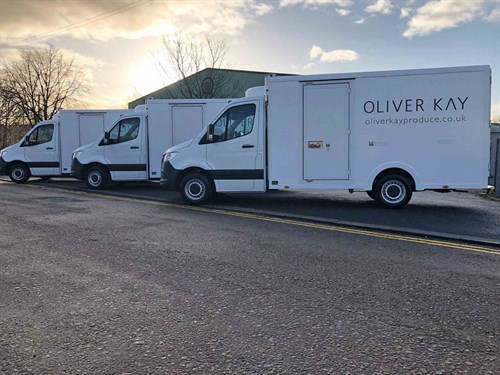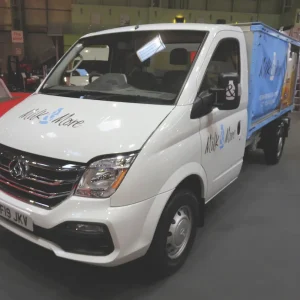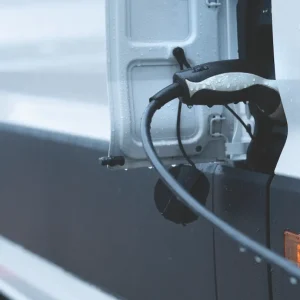It’s been well documented how the growth in the online delivery sector over the past few years has sparked a major increase in demand for vans.
However, while a basic parcel delivery service doesn’t need anything too technical, grocery deliveries are a different matter, with temperature-controlled conversions often required. It therefore seemed like a good time for What Van? to take a look at what’s currently happening in this section of the market.
While some van manufacturers offer basic conversions such as Lutons and tippers in-house, temperature-controlled conversions are strictly the remit of third-party converters.
Volkswagen Commercial Vehicles is one of the brands that will point customers the way of recommended providers through its Recognised Converters programme.
The brand’s specialist sales manager, Nick Axtell, says the idea is that dealers and customers alike should not see specialist conversions as odd or difficult to buy.
“Making sure conversions are as simple for customers to buy, run and maintain as a ‘standard’ van is key to their success,” he says.
“This means collaboration and robust processes between factory, converters, OEM, dealers and customers to ensure nothing falls between the gaps.”
Axtell points out that while the increase in home food delivery has meant increased demand for temperature-controlled conversions, sales actually went down last year, according to the SMMT, something he attributes to replacement cycles, with firms now just recycling vehicles, having expanded fleets previously.
Alongside food and drink retailers and market traders, he says VW also sees demand for transporting pharmaceuticals, which is increasing due to changes in the regulations regarding the movement of drugs.
Commenting on the current market trends, Axtell says: “Payload is king in refrigerated transport – and weight reduction is a key focus. One way we are approaching this is by using the OEM aircon compressor unit configured through the vehicle’s control unit rather than adding on a whole separate bodybuilder fridge unit.”
When asked if Volkswagen is starting to see demand for electrified temperature-controlled conversions, Axtell says: “Yes, but at this stage no-one can run refrigerated vans solely on EV – it is starting to work for fridges but not freezers.
“As soon as you add weight you reduce range, and any refrigerated unit needs to run from a 12V system. We’re working on it!”
One of the third-party converters involved in the temperature-controlled market is Maxi-Low, which claims to have an advantage due to its use of bonded, ultra-lightweight materials, meaning increased payloads and better fuel economy.
It’s no surprise therefore that the firm’s sales and marketing director James Taylor agrees with VW about these being key considerations in the market currently.
He says: “At present we are mainly selling to food companies and chilled couriers that run very close to their maximum weights due to the nature of fridge and chilled conversions that, up until recently, were the only options for delivering goods in panel-derived traditional vans.
“Our customers tell us that our new lightweight fridge conversions ‘have changed the way we do business’ and that ‘we will not be returning to the older-style traditional panel van conversions’ due to the phenomenal uplift in payload [with our conversions].”
Taylor says that Maxi-Low is also being helped by market trends for firms to want to deliver more goods to increasing numbers of clients, but with less impact on the environment.
“By utilising new materials that are lighter, stronger and more resilient than are used within the traditional vehicle conversions, Maxi-Low has been able to assist companies in a number of ways, including reducing the number of vehicles they are using to deliver goods by increasing the vehicle payloads, therefore requiring fewer delivery runs,” he says.
“We’ve also been working with GAH Refrigeration to ensure we only fit the lightest equipment on our vehicles, again to assist with the reduced vehicle weight.
“We intend to release two brand-new refrigerated products at this year’s Commercial Vehicle Show in April, giving even more options to chilled and frozen transport operators that see the benefits of a van that can carry up to 1,400kg.”
When asked if Maxi-Low had seen increased demand for temperature-controlled conversions driven by home delivery market growth, Taylor says: “We have seen a high uplift in the number of enquiries from customers and rental firms wanting to know more about the payload and the benefits we are achieving, and we feel that over the next few months, payload and fuel economy will become even more important and play a much more pivotal role in the decision-making processes of companies.
“With increased focus on the environmental impacts of transport, lighter, cleaner vehicles can only be a good thing, and as the electrification of vehicle fleets becomes more prevalent, vehicle weights will become a key focus to the range and longevity of delivery possibilities.”
Although he names electrification as a trend that is on the horizon, Taylor says Maxi-Low is yet to experience a great upturn in interest from customers.
However, he says the firm will be well placed when this does arrive.
“We haven’t yet seen a large increase of demand for the electric models but we are working in conjunction with a number of mainstream manufactures on our future lightweight build developments.
“We have a number of scheduled projects for Q4 this year, which we hope to release in time for the Commercial Vehicle Show in 2021.”
Looking to the future, Taylor says that the introduction of Worldwide Harmonised Light Vehicle Test Procedure (WLTP) emissions testing is another reason that efficiency will become more important to the industry.
He adds: “As transportation looks for ways to become greener in its outputs, we believe that we are already able to offer a solution to assist these companies, and with the roll out of our new models it’s a very exciting time to be a leading light in this industry.”
It’s not just full converters who are looking to benefit from an increase in demand for temperature-controlled vans. We also spoke to Eberspächer, which sells temperature-controlled units that can be installed in standard vans without needing a full conversion.

Businesses seeking temperature-controlled conversions will have to contact third-party converters
(Continued from page 1) Discussing the firm’s Coldtainer products, Eberspacher UK technical sales manager Paul Hickinbotham says: “These items are ideal for those customers who want to transport chilled and frozen goods within a standard van, possibly within a load of primarily ambient goods.
“The containers are particularly suitable for refrigerated courier businesses. This flexible approach can avoid the need for an expensive dedicated refrigerated van conversion, which is both costly to purchase and run.”
Hickinbotham adds that for companies needing to transport frozen goods, a freezer specification unit can also be installed within a chilled refrigerated van.
He says that as well as transporting food and drink, Eberspacher also sells units to the pharmacy sector, with its products having ISO 15189 certification for medical transportation.
He continues: “The units are a flexible alternative to a traditional refrigerated vehicle, allowing the user to adjust ambient chilled and frozen capacity around the requirements of the day.
“Excess units can be stored until required without the issues associated with converted vehicles and are virtually maintenance ffree.”
Like our other contributors, Hickinbotham says that the growth in the home food delivery market has led to increased demand for Eberspächer’s products.
“We have seen many enquiries from different sectors who have had to adapt to a changing market, sometimes moving from a traditional retail premises to a small distribution hub.
“As the larger couriers gain new contracts, flexibility of vehicle use becomes a factor, with many large players now having small refrigerated or even heated units for last-mile services in a traditional panel van.”
When asked about current market trends, Hickinbotham is another who says that efficiency is a hot topic.
“Efficiency drives and global climate concerns mean that flexibility of both load areas and smaller fleet vehicles are more important than ever.
“Electric vehicles create their own complications, which have forced us to explore range-extending options and adapt our range with rechargeable onboard power supplies.
“Some converters are offering chilled options for electric vehicles but most are not offering freezers, due to the additional power required reducing the vehicle’s range to unpractical levels.”
Hickinbotham sees the demand for products in electrified vehicles steadily increasing as time goes on.
“Electric vehicles are the future and as battery technology improves and climate change deadlines approach this market will grow exponentially.
“A few years ago car-based vans were the only commercial electric vehicles available. Now we have everything from autonomous last-mile pods to the largest panel vans.
“All the main manufactures and fleet owners are having to embrace the new technology.”
For Eberspächer, developing products suitable for electric vans has had the added bonus of opening up other potential customers, as Hickinbotham explains: “[The EV range] has also created a new demand from customers who lease or hire vehicles and can’t alter or modify the vehicle – this can even include just running a DC power supply to the rear.
“The self-powered units have opened up a new market for us. Anyone who has a Coldtainer can now hire a regular panel van to simply transport temperature-sensitive items.”
Hickinbotham adds that it is not just chiller and freezer products that Eberspächer is offering: “A further exciting development of Coldtainer is the Hot Meal Line (HmL), designed to maintain the temperature of hot food (above 65°C) during transport, storage and serving for the whole day.
“Self-powered HmL units are the only available product in the market to guarantee the temperature during transit and transport without any external power source.”
For operators who don’t want to buy a temperature-controlled van, another option is to rent one, from providers such as Enterprise Flex-E-Rent.
Managing director Danny Glynn tells us that it has also seen demand increase from the pharmaceutical sector, but less so from grocery deliveries, with retailers tending to buy their own bespoke vans rather than rent.
He says that a strong current trend is customers looking for higher-specification vehicles.
“Demand for higher-specification vehicles is growing, both in terms of the build and also the ancillaries, such as temperature-monitoring equipment and fridge unit performance,” he says.
“Customers expect even ‘entry-level’ temperature-controlled vans to be higher specification and fitted with the best equipment, so we’ve continually upgraded and adapted our fleet in line with customer demand.”
Glynn says that these are set to be continuing trends, while Enterprise will also keep an eye on electric van conversions as their viability increases.
“The expectation for higher build and equipment specifications is likely to increase in the short and medium term given current levels of demand. Growth in the pharmaceutical distribution sector is driving a large part of the high-end temperature-controlled van rental market.
“In the long term, electric vans are likely to become more viable. As costs come down and range performance improves, electric will probably become a key element of any LCV refrigerated rental fleet.”





